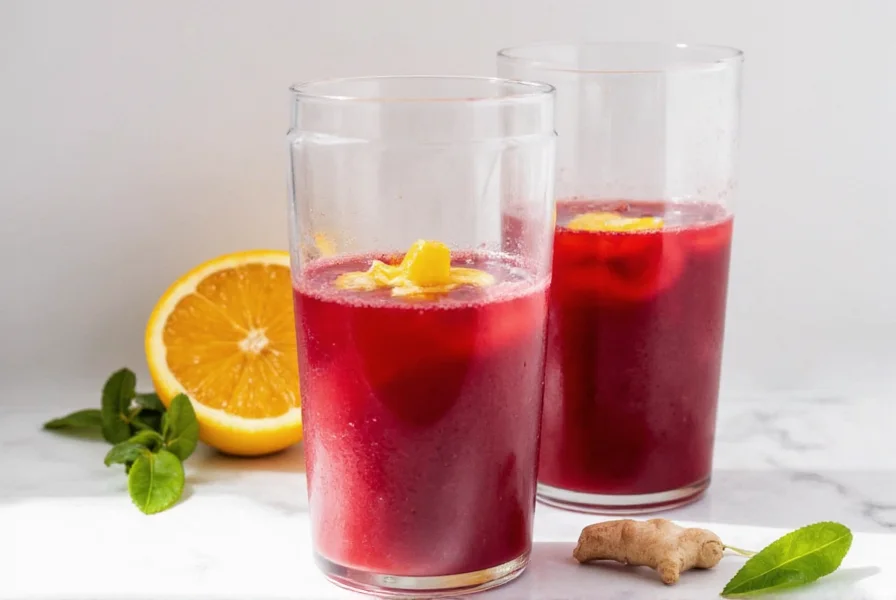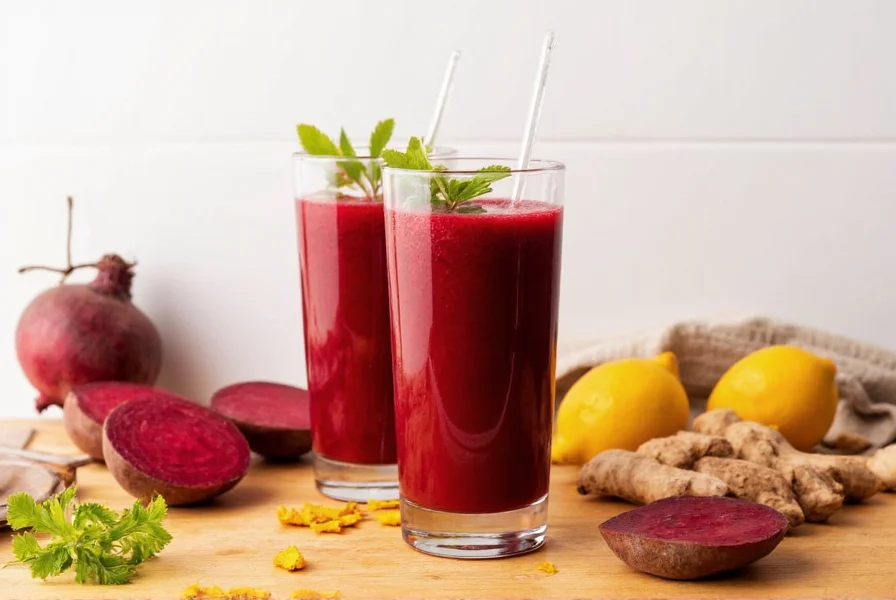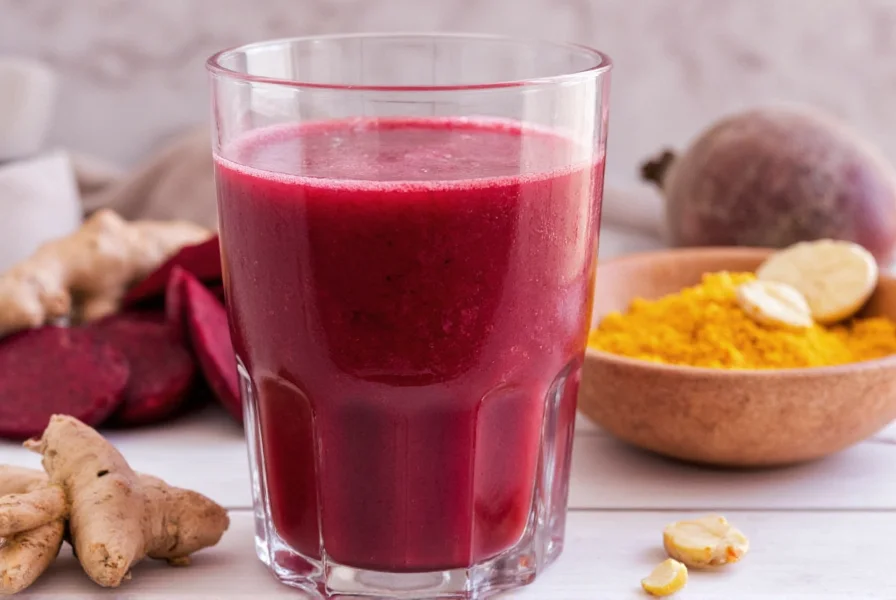Health enthusiasts increasingly turn to beet ginger turmeric juice for its potential wellness benefits. This vibrant beverage merges three powerful ingredients with distinct nutritional profiles. Understanding the science behind each component helps separate evidence-based benefits from exaggerated claims circulating online.
The Science Behind Each Ingredient
Beets contain high levels of dietary nitrates, which the body converts to nitric oxide—a compound that supports blood vessel function. Research published in Journal of Applied Physiology shows dietary nitrates from beets can improve blood flow and lower blood pressure in some individuals.
Ginger's primary active compounds, gingerols, demonstrate anti-inflammatory properties in clinical studies. A systematic review in Nutrients journal noted ginger supplementation reduced markers of inflammation in multiple trials. The pungent root also supports digestive health through its effects on gastric motility.
Turmeric's curcumin has been extensively studied for its antioxidant and anti-inflammatory effects. However, curcumin has low bioavailability on its own. Research in Food Science & Nutrition indicates combining turmeric with black pepper (containing piperine) can increase curcumin absorption by up to 2,000%.
| Ingredient | Key Compounds | Documented Effects |
|---|---|---|
| Beets | Dietary nitrates, betalains | Improved blood flow, exercise performance |
| Ginger | Gingerols, shogaols | Reduced inflammation, digestive support |
| Turmeric | Curcumin, turmerones | Antioxidant activity, cellular protection |
Synergistic Effects of the Combination
The health benefits of beet ginger turmeric juice extend beyond individual ingredients. Beets' nitrates work with turmeric's curcumin to support vascular function through complementary pathways. Ginger enhances the mixture's anti-inflammatory properties while improving digestion of the other components.
When preparing beet ginger turmeric juice for inflammation support, include a pinch of black pepper to maximize curcumin absorption. The vitamin C in fresh lemon juice (a common addition) further enhances iron absorption from beets.

Evidence-Based Health Benefits
Research suggests several potential benefits of regular consumption:
- Cardiovascular support: Multiple studies indicate dietary nitrates from beets can modestly reduce blood pressure. A 2020 meta-analysis in Hypertension found beetroot supplementation lowered systolic blood pressure by approximately 4.4 mmHg.
- Inflammation reduction: The combined anti-inflammatory compounds may help manage chronic inflammation. Research in Journal of Medicinal Food showed ginger and turmeric extracts reduced inflammatory markers in clinical trials.
- Exercise performance: Athletes sometimes use beet juice for its potential to improve oxygen utilization. A study in Journal of the International Society of Sports Nutrition noted enhanced endurance in participants consuming beetroot juice.
It's crucial to maintain realistic expectations—beet ginger turmeric juice works as part of an overall healthy lifestyle, not as a miracle cure. The scientific evidence for these benefits varies in strength, with beet nitrates having the most robust research backing.
How to Make Beet Ginger Turmeric Juice at Home
Creating an effective beet ginger turmeric juice requires attention to preparation methods that maximize nutrient retention:
- Wash one medium beet, one-inch ginger root, and one-inch turmeric root thoroughly
- Peel ingredients (optional for organic produce)
- Add to juicer with ½ lemon (peeled) and a pinch of black pepper
- Include one apple for natural sweetness if desired
- Consume immediately for maximum nutrient benefit
For those without a juicer, a high-speed blender works well. Blend ingredients with ½ cup water, then strain through a nut milk bag. The best time to drink beet ginger turmeric juice is on an empty stomach in the morning or 30 minutes before exercise for potential performance benefits.

Important Considerations and Potential Side Effects
While generally safe for most people, beet ginger turmeric juice may cause:
- Temporary urine or stool discoloration (harmless beet pigment)
- Digestive discomfort in sensitive individuals (especially with large ginger quantities)
- Potential interactions with blood thinners (due to vitamin K in beets and curcumin)
Individuals with kidney stones should moderate beet consumption due to oxalate content. Those with gallbladder issues should consult a healthcare provider before regular turmeric consumption. Does beet ginger turmeric juice lower blood pressure? It may contribute to modest reductions, but shouldn't replace prescribed hypertension treatment.
Avoiding Common Misconceptions
The internet contains exaggerated claims about this juice combination. Scientific evidence doesn't support assertions that it can 'cure' serious diseases or produce dramatic weight loss. The health benefits of beet ginger turmeric juice are generally modest and work best as part of a balanced diet and healthy lifestyle.
Be wary of sources claiming miraculous results or demanding expensive specialized equipment. A standard juicer or blender works effectively for home preparation. Remember that whole food sources generally provide better nutrient synergy than isolated supplements.
Conclusion
Beet ginger turmeric juice offers a concentrated source of beneficial compounds when prepared correctly. The scientific evidence supports modest benefits for cardiovascular health, inflammation reduction, and exercise performance. For optimal results, consume freshly prepared juice containing black pepper to enhance curcumin absorption, and maintain realistic expectations about its effects. As with any dietary change, consult your healthcare provider if you have underlying health conditions or take medications.
Frequently Asked Questions
How often should I drink beet ginger turmeric juice for best results?
Most research suggests consuming beet-based beverages 2-3 times weekly provides measurable benefits without risk of developing tolerance. Daily consumption may be appropriate for short periods (2-4 weeks) when targeting specific goals like improving exercise performance. Listen to your body—some people experience digestive sensitivity with daily ginger consumption.
Can I store beet ginger turmeric juice for later consumption?
Freshly made juice provides maximum nutrient benefit. If storage is necessary, keep in an airtight glass container in the refrigerator for no more than 24 hours. The vitamin C content degrades quickly, and separation will occur. Shake well before consuming. Freezing in ice cube trays allows for convenient portioning but reduces some nutrient availability.
Does cooking beet ginger turmeric juice reduce its health benefits?
Yes, heating above 118°F (48°C) degrades many heat-sensitive compounds, particularly the enzymes in raw ginger and some antioxidants in beets. For maximum health benefits of beet ginger turmeric juice, consume it raw. If you prefer warm beverages, add the juice to warm (not boiling) water or tea after preparation to preserve more nutrients.
Are there any medication interactions I should be aware of?
Turmeric may interact with blood thinners like warfarin. Beets contain vitamin K which also affects blood clotting. Ginger can enhance the effects of anticoagulant medications. If you take diabetes medications, monitor blood sugar as this juice may enhance their effects. Always consult your healthcare provider before adding new dietary components if you take prescription medications.











 浙公网安备
33010002000092号
浙公网安备
33010002000092号 浙B2-20120091-4
浙B2-20120091-4